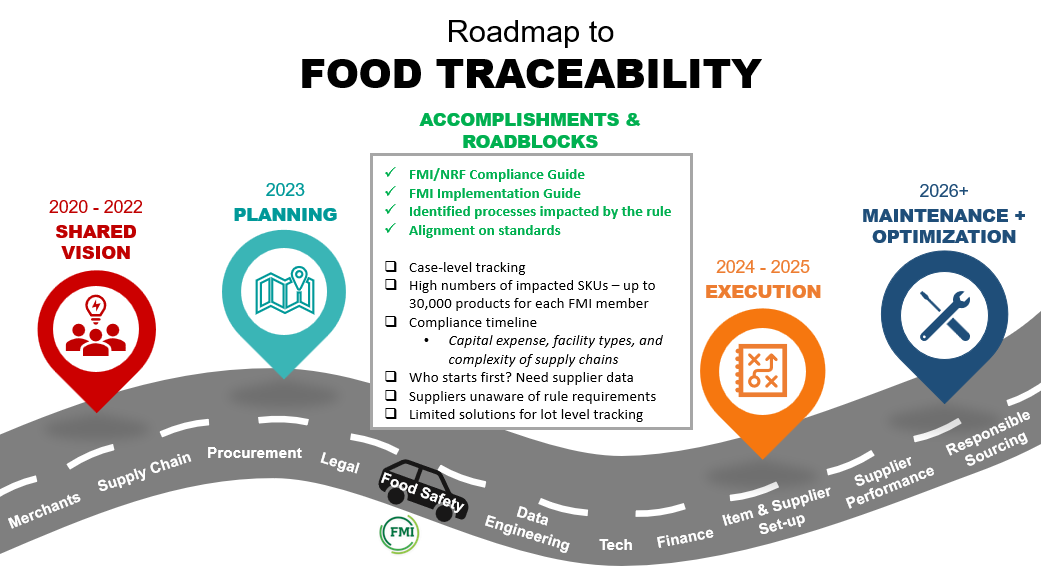By: Leslie G. Sarasin, President and CEO, Food Marketing Institute
 Most of us are knee deep in the annual calendar recalibration known as “back to school month” and are hastily trying to get acclimated to the new pace- frantically searching for the rhythm that feels more like normal and less like a jolt to the system. While all of this is going on, we should remember that back to school time also means back to Congress. In the midst of beginning a new academic year saturated with promise – naturally reinforced by the unblemished hope springing from brand new school supplies, a new classroom and a new set of teachers - the Senate and House of Representatives return to a full slate of leftover tasks, unresolved issues and precious little time to accomplish needed work. The House plans to be in session until it completes a resolution to continue funding the government and then will adjourn until November 14, after the national elections. The Senate also plans to return home to campaign as soon as a continuing resolution is off its plate, potentially next week, with a scheduled return on November 14.
Most of us are knee deep in the annual calendar recalibration known as “back to school month” and are hastily trying to get acclimated to the new pace- frantically searching for the rhythm that feels more like normal and less like a jolt to the system. While all of this is going on, we should remember that back to school time also means back to Congress. In the midst of beginning a new academic year saturated with promise – naturally reinforced by the unblemished hope springing from brand new school supplies, a new classroom and a new set of teachers - the Senate and House of Representatives return to a full slate of leftover tasks, unresolved issues and precious little time to accomplish needed work. The House plans to be in session until it completes a resolution to continue funding the government and then will adjourn until November 14, after the national elections. The Senate also plans to return home to campaign as soon as a continuing resolution is off its plate, potentially next week, with a scheduled return on November 14.
This means the waning days of the 114thCongresss will have an abbreviated work period – colored by all the intrigue the presidential election will bring to it. Add to this the need to pass a budget before the end of year and we are creating the perfect environment for one of those omnibus packages – or at least what is fondly being called a mini-bus bundle of bills – in which all kinds of legislation is clustered and moved to the floor under the motivational cloak of “must pass.” In an atmosphere of expediency, clumping bills together can prove a dangerous vehicle in the legislative process, allowing other, often less desirable, legislation to go through on the coattails of weightier, more pressing bills. This makes vigilant monitoring of legislative details very important, lest a bill with important ramifications to the food retail industry gets bundled with others in the hope of receiving less scrutiny. A case in point is H.R. 5983, the Financial CHOICE Act.
On September 13, 2016, the House Financial Services Committee narrowly approved H.R. 5983 by a vote of 30 to 26, with bi-partisan opposition and no minority support. This legislation, introduced by Chairman Jeb Hensarling (R-TX), included language that repeals a successful debit reform law, or “Durbin Amendment,” enacted in 2010 as part of the 2010 Dodd-Frank Wall Street reform package. FMI supported this law which brought increased competition among banks, lowered routing fees for retailers, and created greater transparency and predictability in the cost of accepting debit cards. Currently, FMI is engaging with House leadership and other members seeking to prevent the bill’s forward movement toward consideration on the House floor, or its inclusion in any end of the year “must pass” packages. We strongly encourage you to contact your Members of Congress and urge them to oppose this anti-competitive legislation.
FMI’s Senior Vice President, Government and Public Affairs,Jennifer Hatcher, has made a brief video describing why you should join the fight to keep the Financial CHOICE Act off of the 2016 legislative docket. I invite you to view her video, here and go to our grassroots letter, here.
While many of us are busy adjusting to the chaos of the new school year, we cannot afford to take our eyes off the details of the national legislative agenda. That would result in a schooling of a different and unwanted type.


 Industry Topics address your specific area of expertise with resources, reports, events and more.
Industry Topics address your specific area of expertise with resources, reports, events and more.
 Our Research covers consumer behavior and retail operation benchmarks so you can make informed business decisions.
Our Research covers consumer behavior and retail operation benchmarks so you can make informed business decisions.
 Events and Education including online and in-person help you advance your food retail career.
Events and Education including online and in-person help you advance your food retail career.
 Food Safety training, resources and guidance that help you create a company food safety culture.
Food Safety training, resources and guidance that help you create a company food safety culture.
 Government Affairs work — federal and state — on the latest food industry policy, regulatory and legislative issues.
Government Affairs work — federal and state — on the latest food industry policy, regulatory and legislative issues.
 Get Involved. From industry awards to newsletters and committees, these resources help you take advantage of your membership.
Get Involved. From industry awards to newsletters and committees, these resources help you take advantage of your membership.
 Best practices, guidance documents, infographics, signage and more for the food industry on the COVID-19 pandemic.
Best practices, guidance documents, infographics, signage and more for the food industry on the COVID-19 pandemic.
